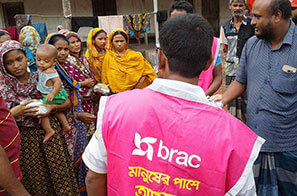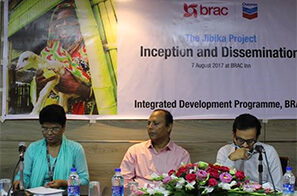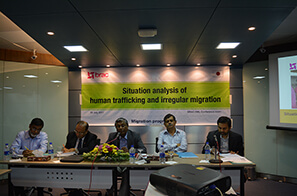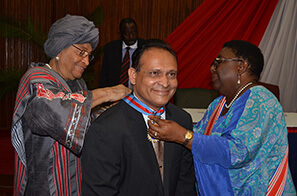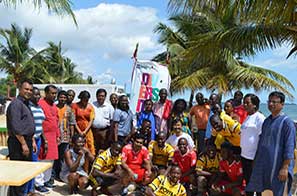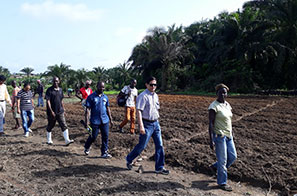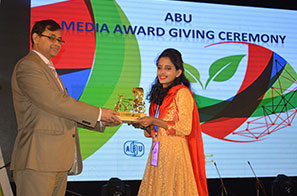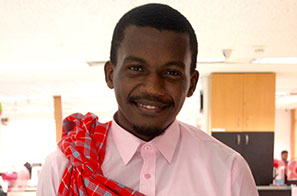
BRAC
29 spots in high risk of riverbank erosion
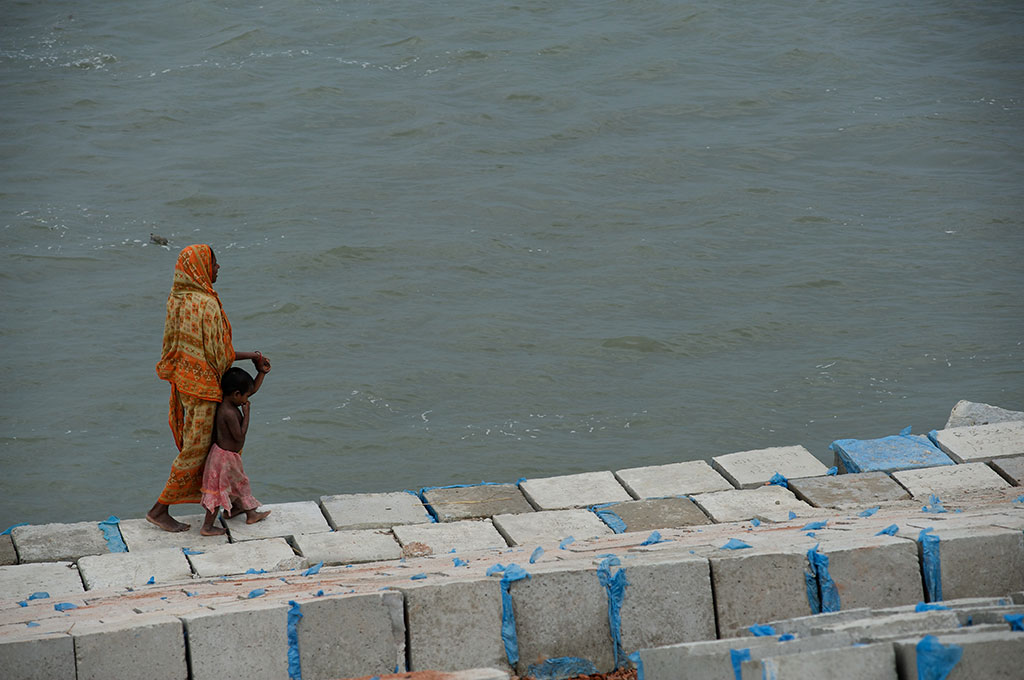
The Centre for Environmental and Geographic Information Services (CEGIS), a trustee organisation of the water resources ministry, has identified 29 high risk spots for riverbank erosion in 2017 through a detailed study of satellite data.
Development organisation BRAC is running an alert campaign in six upazilas of four districts, which are among the high-risk spots identified by CEGIS. The areas are Roumari upazila of Kurigram, Sariakandi upazila of Bogra, Pangsha and Kalukhali upazilas of Rajbari and Jajira and Noria upazilas of Shariatpur. The BRAC campaign is disseminating information to the local people about the intensity of bank erosion in these areas and consequent risk of loss.
Speakers revealed this information at an event titled ‘Consultative meeting on early warning for riverbank erosion’ today on Monday (21 August 2017). The government Department of Disaster Management, CEGIS and BRAC organised the event.
Experts at the meeting ascribed the current rise in the intensity of bank erosion to three main factors, which are, climate change impact, water level rise in river systems during monsoon and recent change in the course of some major rivers. Every year numerous people are becoming destitute overnight, losing all their farmland and homesteads into the rivers. This situation calls for urgent action for making bank erosion forecasts available to the vulnerable communities living on or near the riverbanks at risk.
Speakers at the meeting also called on the government to take immediate measures for riverbank protection, building of new embankments and urgent repair work for damaged embankments.
Sudipta Kumar Hore, junior specialist, River, Delta and Coastal Morphology Division, CEGIS, presented keynote paper titled ‘Early warning of riverbank erosion for 2017’. Md Jafar Iqbal, senior sector specialist, Disaster Management and Climate Change (DMCC) programme of BRAC, also presented another keynote paper titled ‘Riverbank erosion prediction and dissemination: Cases from past years’.
Gawher Nayeem Wahra, director, DMCC, BRAC, and Dr Maminul Haque Sarker, deputy executive director (development), CEGIS, moderated the meeting. KAM Morshed, director, Advocacy for Social Change, BRAC, Syeda Meherunnesa, deputy director, Department of Disaster Management, officials from Bangladesh Water Development Board, university teachers and representatives from non-governmental organisations also spoke at the event.
Gawher Nayeem Wahra said, ‘The technological skills we have mastered so far on riverbank erosion forecasts will be truly rewarding when we will be able to effectively disseminate the information to the common people and utilise this information in strengthening our river system management.’
Dr Maminul Haque Sarker said, ‘Natural calamities like floods and cyclones bring loss to people but they do not lose their land. But riverbank erosion takes away people’s land, both farmland and homesteads. Effective river management therefore remains a high priority issue for us.’
BRAC’s DMCC programme has been implementing a project on the risk of riverbank erosion, forecast and advice in different districts with the technical support from CEGIS. The objective of this consultative meeting was to discuss ways and methods for effective dissemination of forecasts and alert messages on bank erosion in 13 vulnerable spots of 16 upazilas in eight districts.
Deputy head of the DFID Pakistan visited BRAC in Pakistan
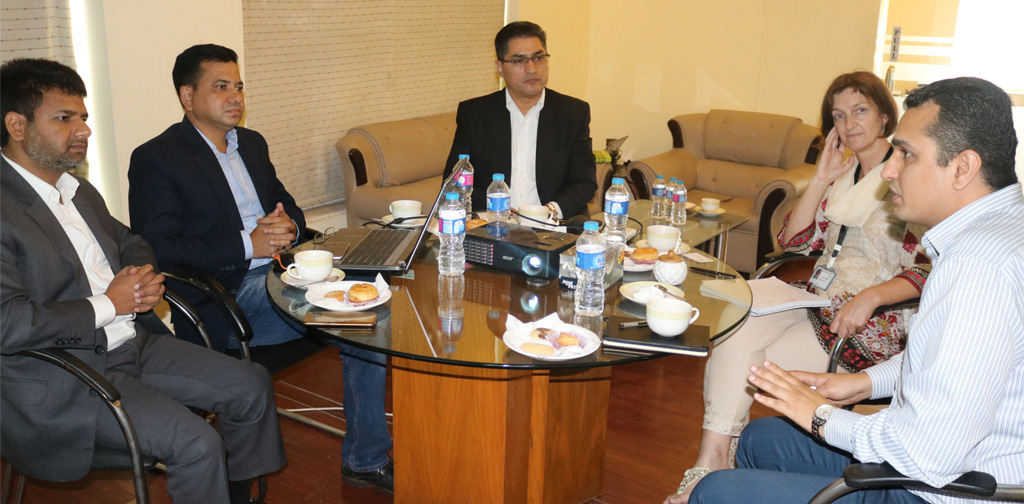 Deputy Head of the Department for International Development (DFID) Pakistan, Ms.Ruth Lawson meeting with Country Management Team in country office BRAC Pakistan
Deputy Head of the Department for International Development (DFID) Pakistan, Ms.Ruth Lawson meeting with Country Management Team in country office BRAC Pakistan
The newly appointed deputy head of DFID Pakistan, Ruth Lawson, visited BRAC in Pakistan head office in Islamabad.
Lawson met with BRAC in Pakistan’s higher management and the head of education programme where she learned about BRAC’s education programme in Pakistan, its achievements and the challenges on the ground. She appreciated BRAC's community based education model and assured DFID’s continuity to collaborate with BRAC in improving the efficiency of the programme to fight illiteracy and low enrolment in the country.
Lawson commended the close collaborations between BRAC’s education programme and the Government of Pakistan and termed it as a positive and effective strategy to increase enrolment of out-of-school children in the country. The chief executive officer of BRAC in Pakistan, Sher Zaman expressed his pledge to ensure quality delivery of education programme and thanked Lawson for her visit and DFID’s continuous support.
BRAC in Pakistan has established 1,500 community-based schools in Karachi, Khairpur, Kambar Shadadkot, Jacoababad districts of Sindh province with funding received from DFID and the Government of Pakistan. In April 2017, 5,500 students have successfully been mainstreamed to government primary schools after completing primary education from 200 BRAC community-based schools.
BRAC stands beside flood affected people
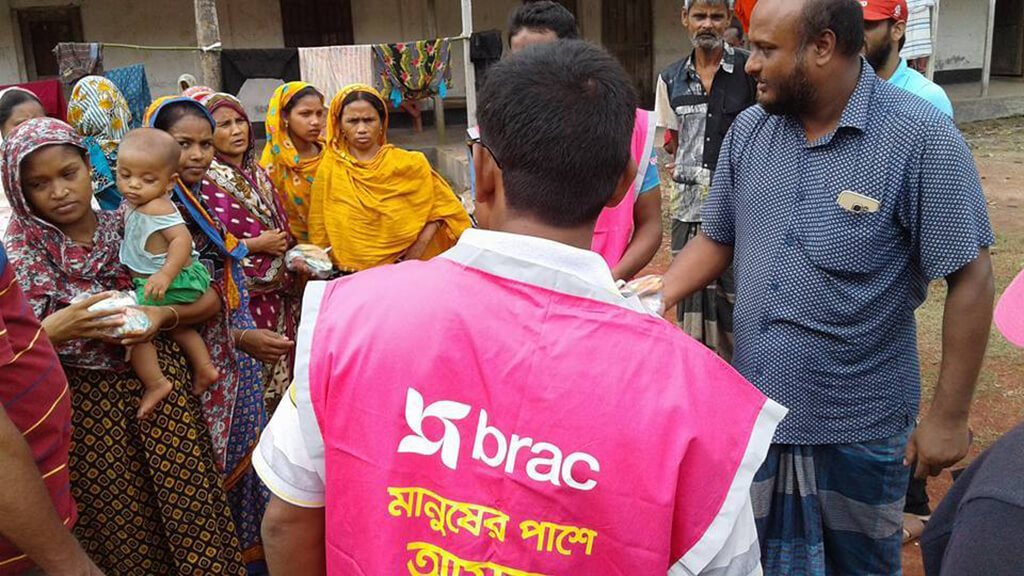
Development organisation BRAC is taking initiatives to help the flood affected communities across the country. Tk 50 thousand has been for each upazila to provide emergency assistance to flood victims. Dry food has been distributed to 22,500 flood victims in Thakurgaon upazila and food has been distributed to 3500 people of Debiganj upazila of Panchagarh.
BRAC is taking its initiatives in coordination with the government departments concerned. The assistance will be continued by BRAC’s Disaster Management and Climate Change (DMCC) programme until the situation adequately improves. The DMCC has already instructed its staff to make necessary expenses to provide assistance to the flood affected people from its relief budget.
BRAC has already undertaken an emergency awareness campaign in the flood affected localities about shifting the women and children to safe shelters from road, railway land and riverbank area where they have taken emergency refuge, safe food supply, use of sanitary latrine and other important public health and safety issues.
According to the flood forecast and warning messages, in the next 10 days districts where flood situation may worsen include Kurigram, Gaibandha, Bogra, Jamalpur, Sirajganj, Tangail, Manikganj, Faridpur, Shariatpur, Chandpur, Rajbari, Chapai Nawabganj and Rajshahi.
BRAC staff has been instructed to provide assistance to the affected people in these districts.
The Jibika project: Dissemination and inception
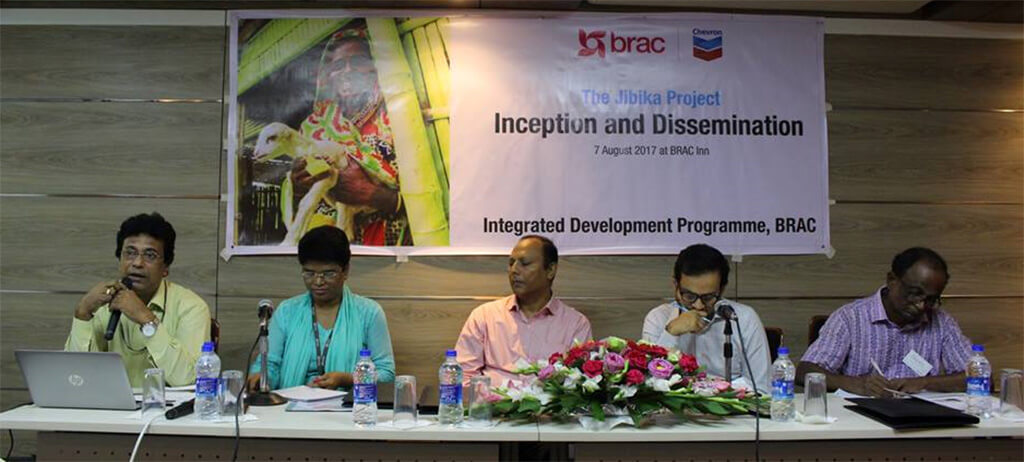
The Jibika project is a collaborative initiative by BRAC and Chevron to improve sustainable livelihoods and social development of vibrant communities around gas fields operated by Chevron Bangladesh in the greater Sylhet region.
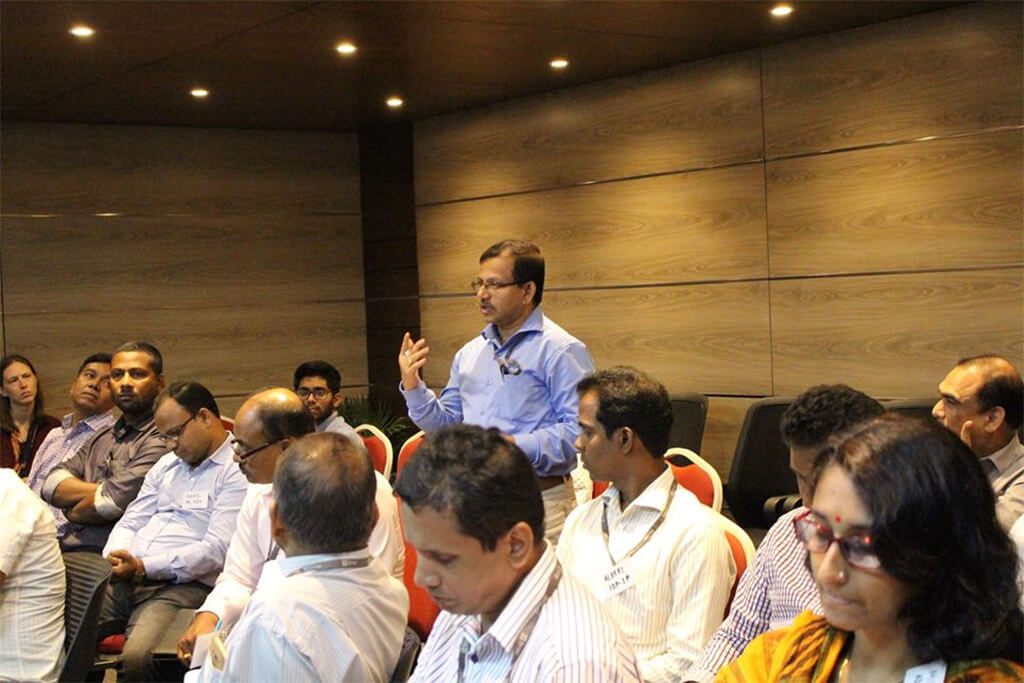 A session on 'Dissemination and inception' of Jibika project was organised at BRAC's conference room yesterday. It was chaired by Anna Minj, Director of Community Empowerment, Gender Justice and Diversity, and Integrated Development Prgramme of BRAC. Shyam Sundar Saha, Programme Head of IDP presented the glimpse of Jibika pilot phase and also shared the key areas for further development. Naser Ahmed, Director, External Affairs, Chevron Bangladesh, appreciated both BRAC and IDEA’s efforts for implementing such a challenging project successfully.
A session on 'Dissemination and inception' of Jibika project was organised at BRAC's conference room yesterday. It was chaired by Anna Minj, Director of Community Empowerment, Gender Justice and Diversity, and Integrated Development Prgramme of BRAC. Shyam Sundar Saha, Programme Head of IDP presented the glimpse of Jibika pilot phase and also shared the key areas for further development. Naser Ahmed, Director, External Affairs, Chevron Bangladesh, appreciated both BRAC and IDEA’s efforts for implementing such a challenging project successfully.
As special guest, Asif Saleh, Senior Director, Strategy, Communication and Empowerment of BRAC explained the reason why BRAC engaged itself with corporate agencies. He said, 'development is not a T20 game; it's all about long-term game which requires time to make behavioral changes. The development agencies like BRAC is expecting more corporate engagement with those who are getting involved in development initiatives with their CSR funds.'
Nazmul Haque, Executive Director of IDEA (Implementing partner of Jibika) delivered the concluding remarks with vote of thanks.
Situation analysis of human trafficking and irregular migration

Bangladesh in image crisis for human trafficking and irregular migration to Europe in sea routes
Trafficking godfathers must be caught: NHRC chair
Bangladesh is now among the top countries of origin for illegal immigrants in Europe. In the first six months of the current year (2017), 7,899 illegal Bangladeshi migrants entered Europe through the Mediterranean Sea route only, according to Frontex, an organisation of European Council working to coordinate between the border security forces of European Union member countries.
Speakers revealed this information at a consultation meeting today on Saturday (29 July 2017) at BRAC Centre Inn. Development organisation BRAC organised the event titled 'Situation analysis of illegal trafficking and irregular migration' on the occasion of World Day against Trafficking in Persons.
Kazi Reazul Hoque, chairman, National Human Rights Commission Bangladesh, was present at the programme as the chief guest.
Chaired and moderated by Asif Saleh, senior director, strategy, communication and empowerment, BRAC and BRAC International, the event was also attended, among others, by Jabed Ahmed, additional secretary, expatriates welfare and oversees employment ministry, C R Abrar, professor, International Relations, Dhaka University, also coordinator of Refugee and Migratory Movements Research Unit (RMMRU), and Shah Alam, Additional Deputy Inspector General of CID. Representatives of different development organisations, senior police officers and senior journalists were also present at the meeting.
Md Shariful Hasan, programme head, BRAC Migration Programme, presented the keynote article at the event. Analysing the situation from different angles he said that there is no definite statistics about the exact number of Bangladeshis currently staying illegally in Europe. However, a European Union delegation during their Dhaka visit in this April stated that around 80 thousand illegal Bangladeshi migrants are currently stating in Europe. The European Commission statistics office Eurostat states that in 2008-2015 period 93,435 Bangladeshis were staying illegally in the European countries. This number should cross 100 thousand if the account of the first six years of current year is added to 2008-2015 account.
NHRC chair Kazi Reazul Hoque at the programme said, 'It is true that we have an excellent law formulated in 2012. About the same time law was passed against money laundering. But certainly question is there about the extent of their proper implementation.'
'According to the police, only 30 convicts have been given life imprisonment so far out of 3500 human trafficking cases,' he further said, observing pointing out a number of weaknesses in the present manner of dealing with such cases. 'Many times the court does not have anything to do against the perpetrators because the police give flawed reports.' 'No matter how the incidents took place it is our responsibility to protect human rights,' the NHRC chair stressed, 'the state must take responsibility'. He suggested that the government may undertake making a shortlist of 25 top 'godfathers' to chase and nab them.
Professor C R Abrar said, 'We must keep in mind that the human traffickers in both country and abroad are a highly powerful coterie. We have to be have sufficient preparation to bring them to book.'
Expatriate welfare additional secretary Jabed Ahmed said, 'Reducing the cost of migration is still the biggest challenge. When someone migrates spending an excess amount of money, in the urge of recovering that expenses many times they become irregular.'
He stressed on strong coordination among the home ministry, foreign affairs ministry, commercial aviation and other relevant ministries to prevent human trafficking.
BRAC senior director Asif Saleh presented the recommendations of the consultation meeting, saying 'We should focus on four main issues to prevent human trafficking: Ensuring accountability of the law enforcement agencies, utrilising the mass media to raise mass awareness, ensuring follow-up of legal cases and ensuring strong coordinator among the relevant ministries.'
Expatriates welfare and oversees employment ministry's deputy chief K M Ali Reza, development practitioner Asif Munir, additional police super of anti-human trafficking cell of Bangladesh Police Masura Begum, and Rapid Action Battalion deputy director Abdullah Al Maruf also spoke among others.
Speakers also told the meeting that in the early July this year around 2,000 illegally travelling Bangladeshis have become stuck in Turkey en route to Europe. The scenario becomes even bleaker when the illegal travel to Malaysia and Thailand through dangerous sea routes and the mass graves recently discovered in those countries are considered. Malaysia has already started its operation against illegal immigrants, while Saudi Arabia is taking its preparation. According to the expatriates welfare and oversees employment ministry, around 800 thousand (8 lakh) Bangladeshi migrants returned for lacking legal documents.
The speakers further said Bangladesh's status in the annual report of the US foreign affairs ministry published this has gone one step down. In this report the relevant countries are divided in three tiers. In last five years Bangladesh was in Tier-2, while this year it has been positioned one step down to Tier-2-Watch List along with 45 other countries including Saudi Arabia, Algeria, Pakistan, Thailand and Hong Kong. This scenario is a really worrying one particularly at this juncture when Bangladesh is poised for upgrading itself to a middle-income country and aspires to establish a strong safe migration process.
Referring to International refugee Organisation, the speakers said in last ten years around 150 thousand Bangladeshis have been the victim of illegal trafficking through Bay of Bengal routes. Of then at least 1500 died in the sea. Of the over 200 dead bodies recovered from the mass graves of Malaysia and Thailand, many were of Bangladeshi citizens. According to the information from the Bangladesh foreign affairs ministry and International Organisation for Migration (IOM), the government returned 2,183 Bangladeshis, of whom 183 are children. According to the police headquarters, since the Prevention and Suppression of Human Trafficking Act, 2012 was passed around 3500 cases were filed. But the victims complain that most of these cases are seriously delayed.
BRAC in Liberia honoured by Her Excellency President Sirleaf
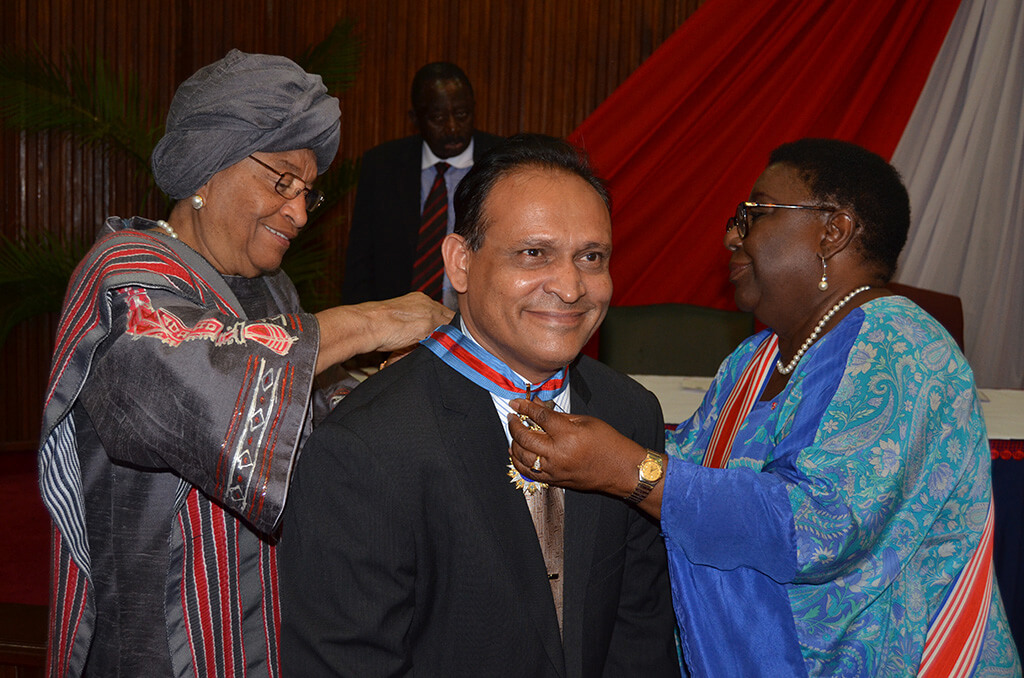 Country Representative of BRAC in Liberia receiving the medal from Her Excellency President Sirleaf
Country Representative of BRAC in Liberia receiving the medal from Her Excellency President Sirleaf
BRAC in Liberia was honoured by the President of Liberia, Her Excellency Mrs. Ellen Johnson Sirleaf, during the celebrations marking the 170th Anniversary of the independence of Liberia. The investiture ceremony took place on 25 July, 2017 at the C. Cecil Dennis, Jr. Auditorium in the Ministry of Foreign Affairs in Monrovia.
President Sirleaf, herself the Grand Master of the Order of Distinction of the Republic of Liberia, admitted BRAC into the Humane Order of Africa Redemption and conferred the Grade of “Knight Commander” in consideration of the contributions of BRAC to alleviate poverty in Liberia. Mainuddin Ahmed, the Country Representative of BRAC in Liberia, received the medal on behalf of BRAC.
 The Knight Order Certification for BRAC in Liberia
The Knight Order Certification for BRAC in Liberia
The President recognised and publicly appreciated BRAC’s contributions to the socio-economic development of Liberia through multi-sectoral programmes which have spurred economic recovery and growth over the past ten years.
Celebrating diversity in Sierra Leone
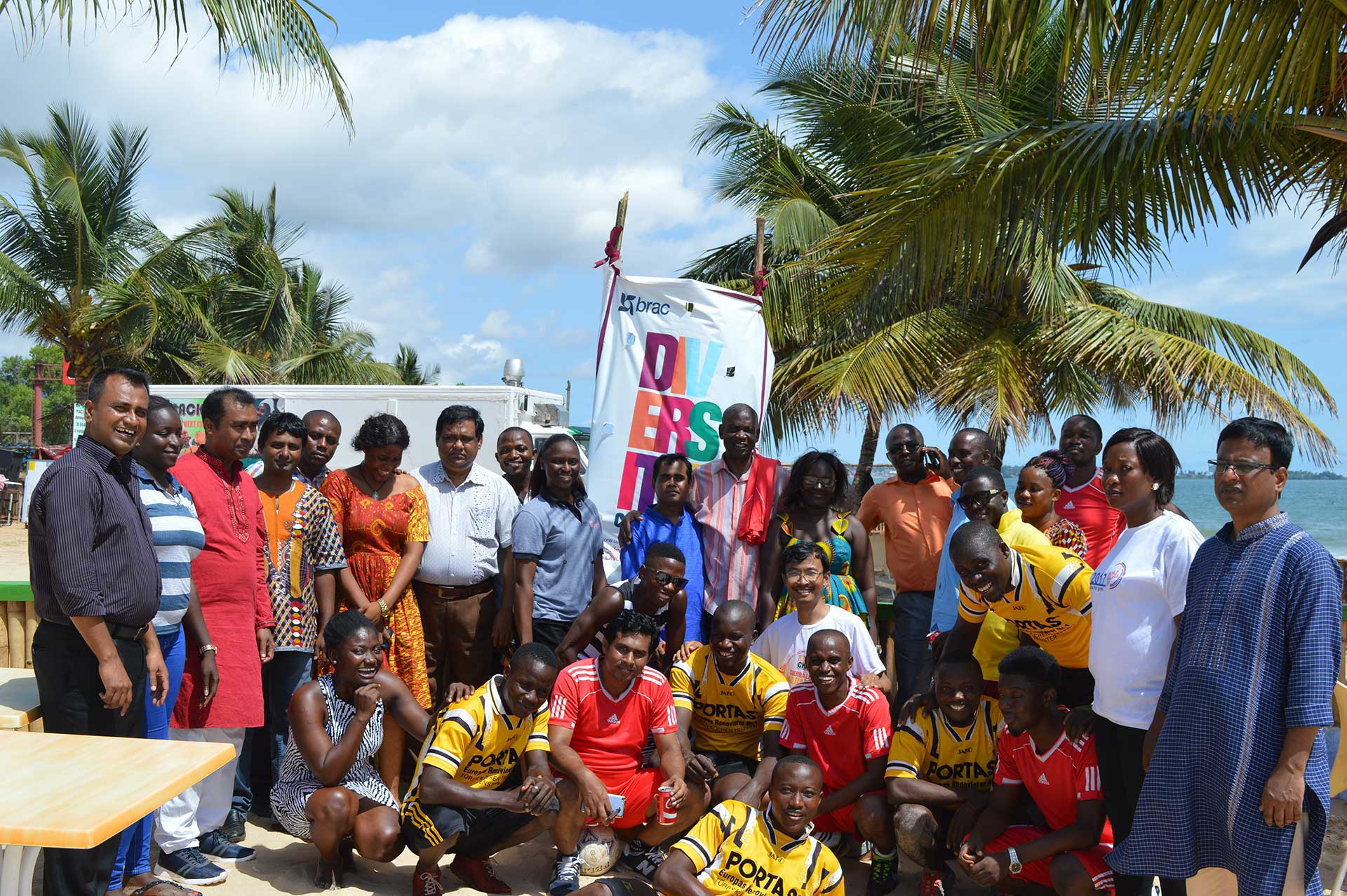 BRAC in Sierra Leone celebrating diversity
BRAC in Sierra Leone celebrating diversity
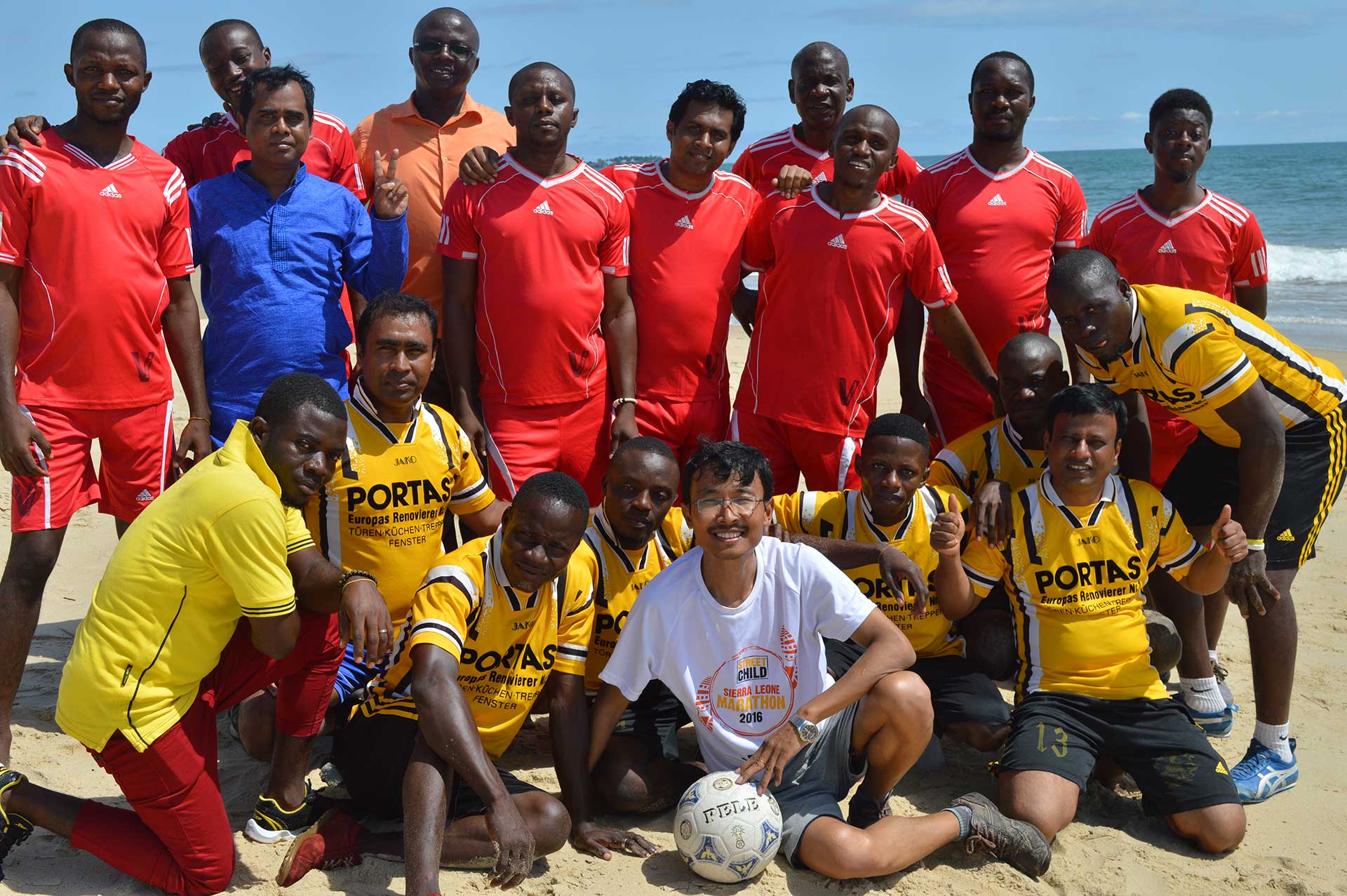 BRAC in Sierra Leone football team on Diversity Day
BRAC in Sierra Leone football team on Diversity Day
BRAC in Sierra Leone celebrated the World Day for Cultural Diversity for Dialogue and Development across the country. All area offices, branch offices and the country office got involved for the occasion.
The country office celebrated the day at the famous Aberdeen/Lumley Beach with cultural events, food, and sports and games. Representatives from each ethnic group in our offices talked about their cultural practices, norms and values of their respective tribes, followed by music and dancing.
The staff partook in various sports and games afterwards, including football, volleyball, musical chairs, Ludo and more.
BRAC International executive director’s visit to Liberia
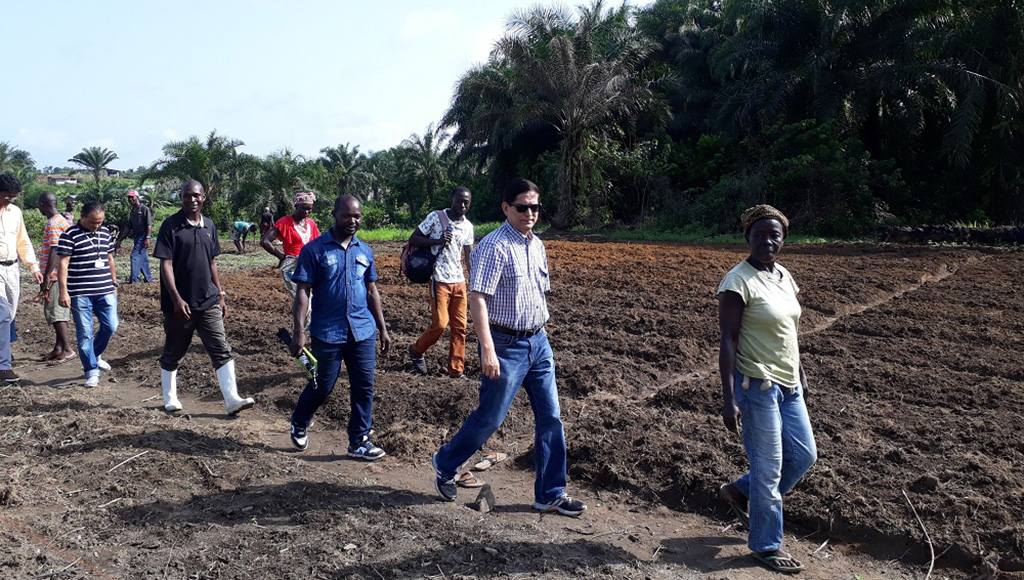 BI ED visit Cash for work (CFW) site at Airport branch
BI ED visit Cash for work (CFW) site at Airport branch
The executive director for BRAC International, Mr Faruque Ahmed visited BRAC in Liberia from May 9, 2017 to May 12, 2017. During this time, he visited several project sites and met with some of the beneficiaries and staffs of the programmes, including microfinance, early childhood development and cash for work.
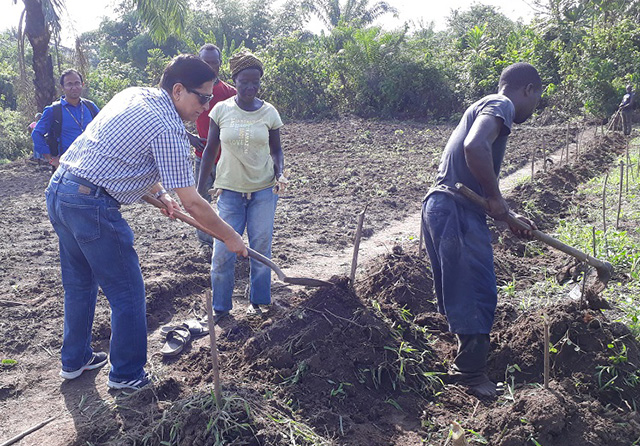 BRAC Int.l Executive Director demonstrate mount preparation for Cassava
BRAC Int.l Executive Director demonstrate mount preparation for Cassava
Mr Ahmed met with Her Excellency President Ellen Johnson Sirleaf to discuss how BRAC can provide a platform for the Government to achieve their goals. He also held meetings with various other Government officials and donors in the trip, including the Minister of State for Presidential Affair Mr Slyvester M. Grigsby, the Minister of Agriculture and the Ambassador and Delegates of European Union to Liberia.
Mr Ahmed concluded the trip by spending time with the team in Liberia and engaging in some lively discussions with the staff.
Radio Pollikontho wins ABU Awards
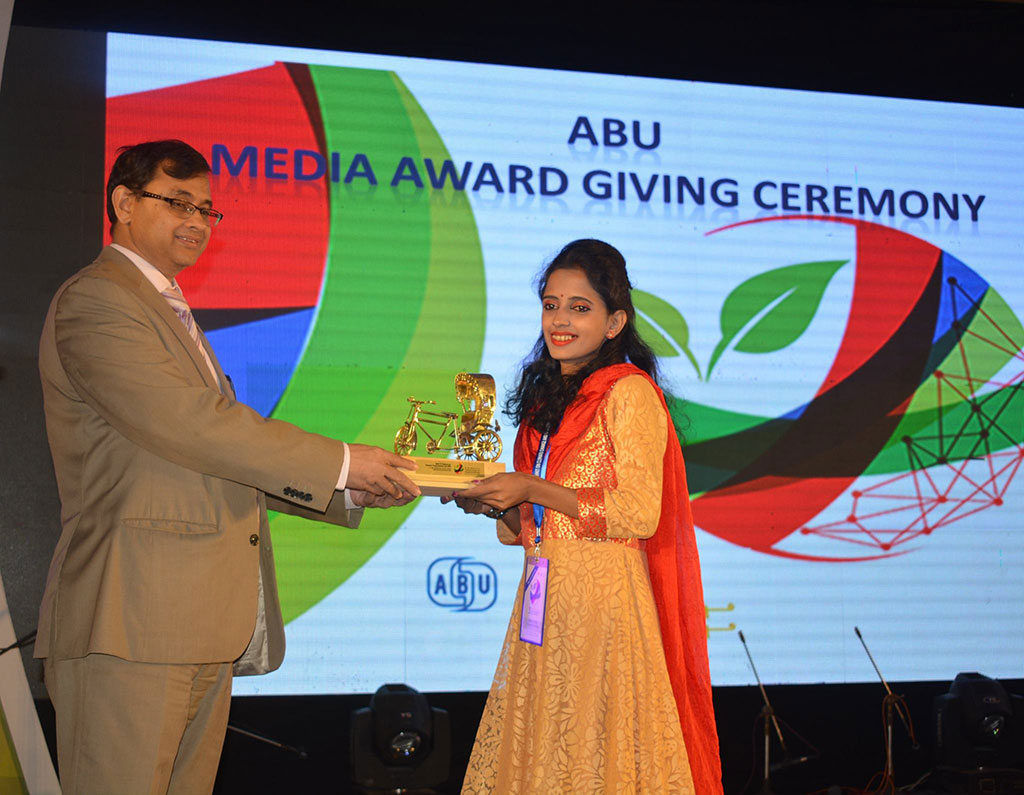
Community Radio Pollikontho (99.2 FM), an initiative of BRAC Community Empowerment Programme (CEP) has been honoured with the ABU (Asia-Pacific Broadcasting Union) Awards on Climate Change and Disaster Risk Reduction.
Ankhi Palit, the producer of Community Radio Pollikontho received best radio feature international award in the category of “Disaster Risk Reduction“ in a competition of the broadcasters organised by Asia-Pacific Broadcasting Union (ABU).
The award was given in recognition of the best production and presentation of a community radio feature titled: “Follow Earthquake Practices and save yourself.” Ankhi Palit produced the programme following a radio script prepared by Biplob Kanti Dev, another producer of Radio Pollikontho.
Martuza Ahmed, hon’ble secretary of the Ministry of Information handed over the prize to Ankhi Palit on 10 May 2017 at a Gala night held at Bangabandhu International Conference Center, Dhaka. Radio Pollikontho is the only recipient of this award from Bangladesh.
The ABU recognises the best productions in radio and television categories every year to encourage inspiring stories across the globe on climate change adaptation, disaster preparedness and disaster risk reduction. Hasanul Haque Inu MP, hon’ble minister for Ministry of Information, & Dr. Javed Mottagi, secretary general, the Asia - Pacific Broadcasting Union (ABU) and all participants of 3rd ABU Media Summit were present during the Gala Awards Ceremony. This is annual competition honours the best Radio and Television programme on climate change adaptation, disaster preparedness and disaster risk reduction. The competition has two radio and two television categories and two special awards.
Community Radio Pollikontho 99.2 FM, was launched in 2011 at Moulvibazar district with the aim to increase access to information and also strengthen grassroots voice, especially of women. The programmes are designed to address socio-economic issues within the community, prioritising on women and children. Currently, 729 listeners clubs have been formed to ensure greater community engagement with the radio station. It is mentionable that in 2015, it won `The ABU Prize’, organised by Asia-Pacific Broadcasting Union, for the radio programme on autism called Tobuo Shopno (ray of hope). It won Meena Media Awards of UNICEF Bangladesh, in 2013, 2014, 2015 and 2016 for its work in promoting child rights and children’s education in the media. It also won Family Planning Media Award 2013, organised by the Ministry of Health and Family Welfare in cooperation with UNFPA, for its programme called Shushasthya (Good Health).
Diversity Day 2017
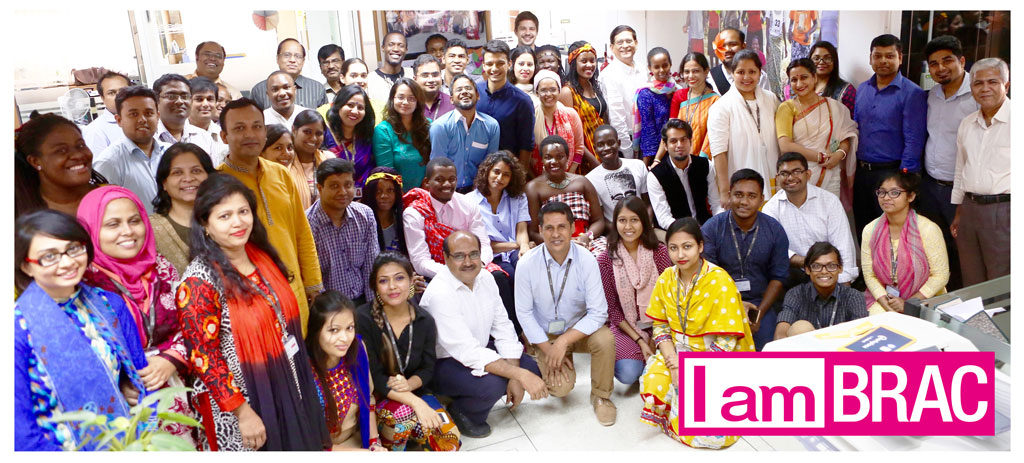 WE ARE BRAC!
WE ARE BRAC!
BRAC International celebrated World Cultural Diversity Day on May 21, 2017, across its countries, as well as at the head office in Dhaka. The staff in Dhaka was joined by the second batch of international Young Professionals, who are visiting on training purposes.
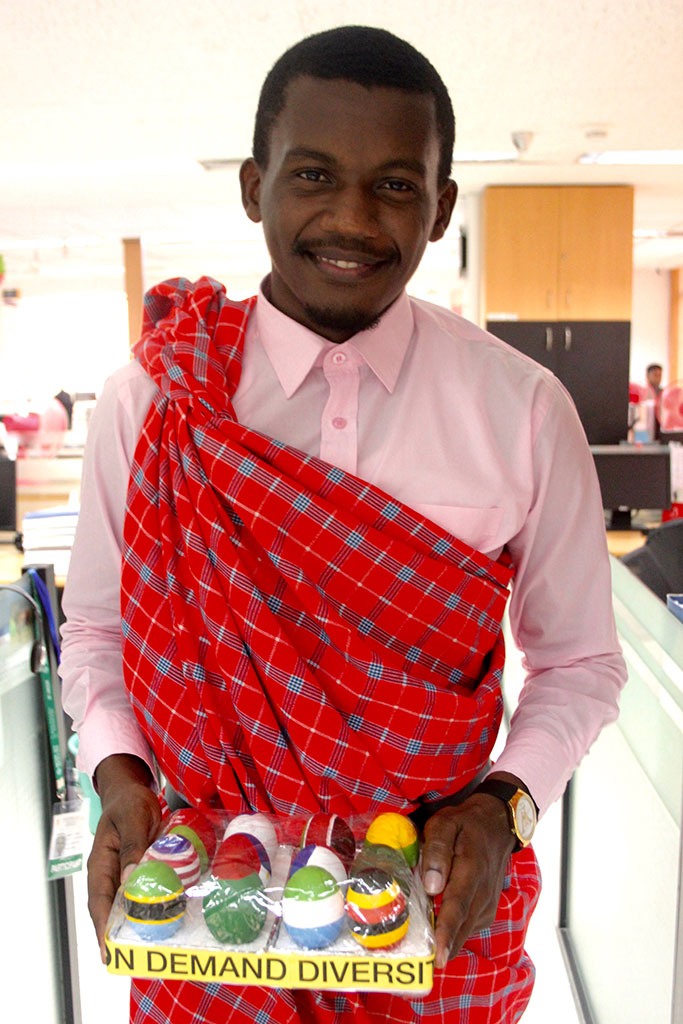 Mohammed Madaty as best dressed with his award
Mohammed Madaty as best dressed with his award
BI hosted a small ceremony where people were encouraged to dress up, representing a culture of their choice. It was a very colourful event with attires from all corners of the world. The event started with the Head of Communications, Ms. Shehzeen Chowdhury giving her take on diversity, explaining how BRAC International gains its strength through the presence of various ideas and thoughts from different cultures and traditions. Her sentiments were echoed by more speakers who shared similar sentiments.
After talking about diversity for a bit, a vote was taken to establish who was the best dressed for the day. The winner was Mr. Mohamed Madaty, one of our Young Professionals from Tanzania. Mr. Madaty expressed his gratitude at winning the award and dedicated it all his colleagues.
BRAC International prides itself on its diversity and continues to foster an environment which is welcoming to people from all walks of life.
 BRAC International Young Professionals 2017
BRAC International Young Professionals 2017
Join the world’s biggest family


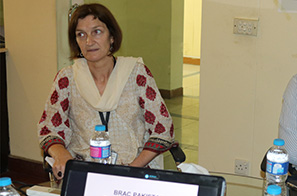 Deputy Head of the Department for International Development (DFID) Pakistan, Ms.Ruth Lawson meeting with Country Management Team in country office BRAC Pakistan
Deputy Head of the Department for International Development (DFID) Pakistan, Ms.Ruth Lawson meeting with Country Management Team in country office BRAC Pakistan